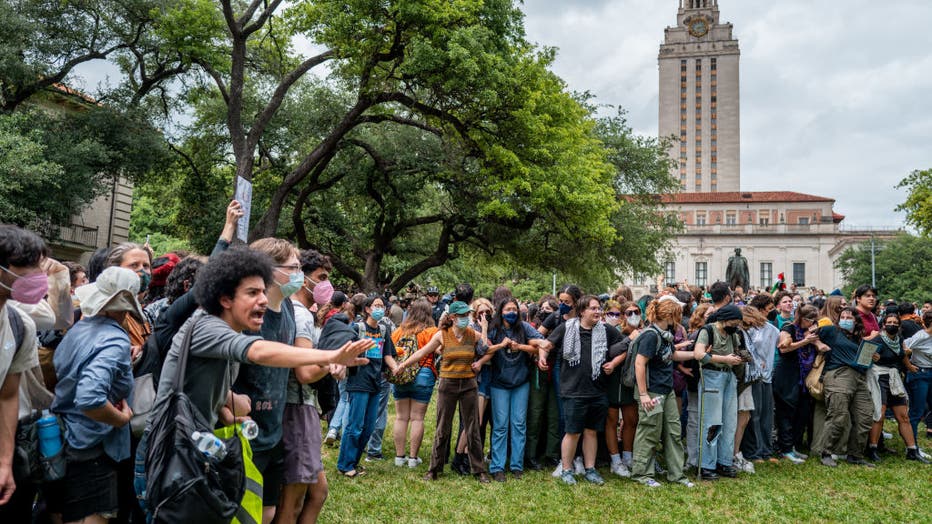First Amendment questions raised after UT Austin protest arrests

Protest arrests raise First Amendment questions
Nearly 60 people were arrested Wednesday, including a FOX 7 news photographer. The arrests, especially of a journalist, raise questions about the right to assemble and freedom of the press.
DALLAS - It was another day of protests on Thursday at the University of Texas at Austin with pushing and shoving between police and protesters.
Nearly 60 people were arrested Wednesday, including a FOX 7 news photographer.
The arrests, especially of a journalist, raise questions about the right to assemble and freedom of the press.
Voices were raised in chants on the second day of protests at UT Austin.
There were a number of different groups, including some university staff.

AUSTIN, TEXAS - APRIL 24: Students rally together during a pro-Palestine protest at the The University of Texas at Austin on April 24, 2024 in Austin, Texas. (Photo by Brandon Bell/Getty Images)
Stewing at how the university and law enforcement responded to protests over the Israel-Hamas war Wednesday, some faculty members are now seeking a recall vote of UT President Jay Hartzell.
The FOX 7 photographer was released from jail Thursday morning as were many others who were arrested for criminal trespass on Wednesday.
Thomas Leatherbury is director of the First Amendment Clinic at SMU. He says journalists should not be jailed for covering public demonstrations.

UT Austin Palestine rally: FOX 7 photographer detained
A photographer for our sister station, FOX 7 in Austin, was detained in the middle of a protest at UT Austin on Wednesday. The photographer's camera was being livestreamed at the time.
"I feel particularly pained by the arrest of photographers," he said. "They're not protesting; they're covering the protest. And I wouldn't be surprised if they caught footage of a disproportionate police response, and that's why they were arrested."
Gov. Greg Abbott tweeted Wednesday in defense of his decision to send DPS officers to the campus, saying, "Students joining in hate-filled, antisemitic protests at any public college or university in Texas should be expelled"
The UT president is also defending the use of law enforcement against protest groups he said "tried to deliver on their stated intent to occupy campus."
But Thursday, the Travis County district attorney dropped all charges against the FOX 7 photographer and others, writing, "We individually reviewed each case that was presented… There were deficiencies in the probable cause affidavits. The court affirmed and ordered the release of those individuals."
"I'm not surprised. That's what District Attorney Creuzot did to the vast majority, if not all, of the criminal charges that were filed in Dallas after the murder of George Floyd, and I think that's the right thing to do," Leatherbury said. "Unless you have specific evidence that an individual was engaging in violent conduct, then I think err on the side of protecting protests and certainly err on the side of protecting peaceful protests."
Featured
Israel-Hamas war: Protesters march around the world to call for ceasefire
The Israel-Hamas war has led to the loss of thousands of lives in the Gaza Strip. Pro-Palestinians advocacy groups are pushing for a ceasefire, putting pressure on world leaders including President Joe Biden.
Colleges and universities do have the right to set reasonable time, place, manner and restrictions on peaceful public protests, and state officials can enforce criminal laws if the laws are applicable.
"It's going to be a real fact-intensive exercise to see, was the police response disproportionate to what was going on? Was there unprotected speech that was happening?" Leatherbury wondered. "For example, was it peaceful or was there true threats to Jewish students or true threats to Pro-Palestinian students?"

UT sets curfew following calmer day of protests
The University of Texas at Austin set a 10 p.m. curfew following a second day of pro-Palestine protests.
Leatherbury pointed out that even if the protests crossed the line into hate speech, that is still legally protected under the First Amendment of the U.S. Constitution.
The news photographer now has outside private counsel and was advised to not talk about his arrest or night in jail.


